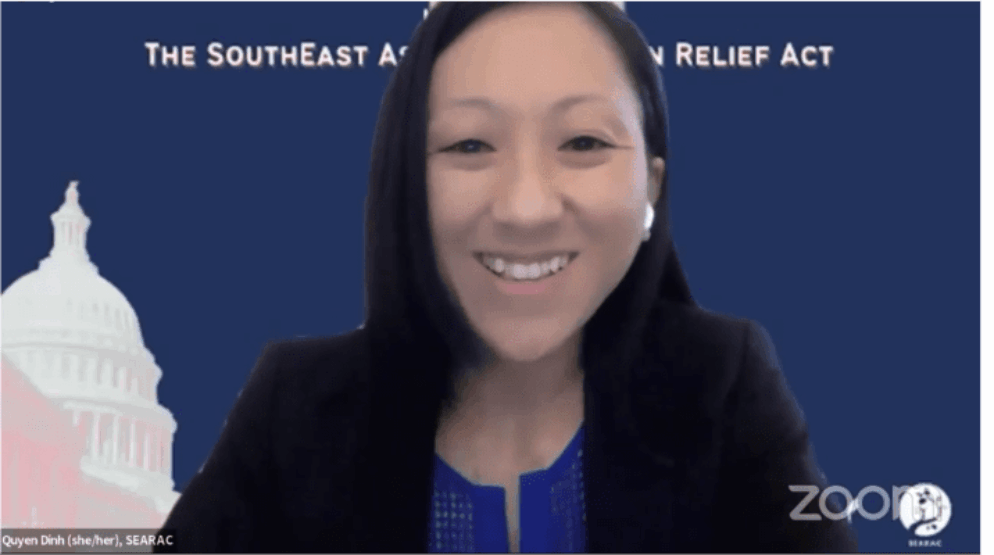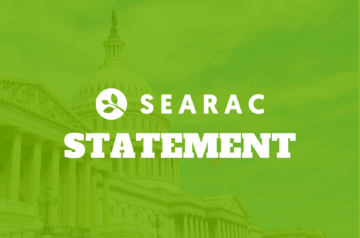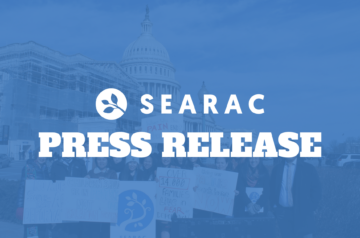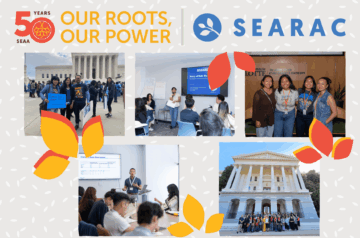Washington, DC –SEARAC and SEAFN are proud to announce the reintroduction of the Southeast Asian Deportation Relief Act (SEADRA) in the US House of Representatives, sponsored by Reps. Judy Chu (CA-28), Pramila Jayapal (WA-7), Zoe Lofgren (CA-18), and Ayanna Pressley (MA-7). SEADRA is historic federal legislation that would free Southeast Asian American (SEAA) refugee and immigrant families from the continuous fear and trauma of being torn apart from their loved ones and communities.
Specifically, SEADRA would end the unjust deportations of Southeast Asian refugees and provide further protections for the more than 15,000 community members with final orders of removal. The bill:
- Limits DHS’ authority to detain or deport Southeast Asian refugees from Cambodia, Laos, and Vietnam who arrived in the United States by 2008;
- Permanently authorizes employment eligibility for Southeast Asians with a final order of removal with a five-year renewal period; and
- Ends in-person ICE check-ins and establishes five-year intervals between virtual check-ins for Southeast Asians on order of supervision.
Additionally, the new version of the bill includes a provision to ensure that Southeast Asian refugees who have already been deported can return home to the US and be reunited with their families. For Southeast Asian refugees who are still in the US and face deportation, the changes allow them to fight their deportation order to remain in the country.
Lan Le, an Impacted Leader at Asian American Resource Workshop (AARW) said, “The Southeast Asian Deportation Relief Act (SEADRA) is important to me because it would provide relief for our people who need a second chance at life. Passing SEADRA would mean that our families and communities wouldn’t be torn apart. If SEADRA passed, we could rebuild our lives and futures. We need hope and dreams, and seeing SEADRA supported and passed will show us that we can still have hopes and dreams for our lives and futures.”
Sophea Phea, an Impacted Leader at the Southeast Asian Freedom Network (SEAFN) said, “The pain of deportation is immeasurable. As refugees of war, my family and I have endured the trauma of displacement and separation not once, but twice. Through this experience, I have seen the resilience of my people. We have endured great loss and trauma, and yet we have also shown resilience and hope in the face of despair. But we should no longer have to be resilient. We deserve to live in peace and with justice, without the fear of deportation. SEADRA will help do this. By ensuring that Southeast Asian families can live without the fear of separation, this historic bill will start the healing for our community, and allow us to finally feel safe and dignified.”
Congresswoman Judy Chu said, “We must restore humanity to our broken immigration system. Deporting over 15,000 Southeast Asian American refugees who fled violence and genocide decades ago is a betrayal to our duty to refugees and needlessly rips apart families. We cannot risk letting future Administrations create policies based on bigotry and hate, so I am joining my colleagues today to reintroduce the Southeast Asian Deportation Relief Act. This landmark legislation would limit the Department of Homeland Security’s ability to remove members from these communities and send them to countries where they have often never even lived, and we’ve added a provision this Congress to strengthens the process of reopening deportation cases — ensuring that Southeast Asian refugees who have already been deported can return home to the US.”
“Immigrants deserve to be treated with respect and dignity, and that means ensuring that they don’t live in constant fear of deportation,” said Congresswoman Pramila Jayapal. “The Southeast Asian Deportation Relief Act is a long-overdue step to bring immediate relief to families in communities across this country. Welcoming doesn’t end at opening the door, and it’s time to reform our broken immigration system and protect Southeast Asian refugees.”
“More than 1.2 million Southeast Asian refugees settled in the US after the Vietnam War. They all deserve safety and security,” said Congresswoman Zoe Lofgren. “The government should not be deporting refugees to countries where they may face persecution or human rights abuses. The Southeast Asian Deportation Relief Act will keep our promises to Southeast Asian refugees and protect them from removal.”
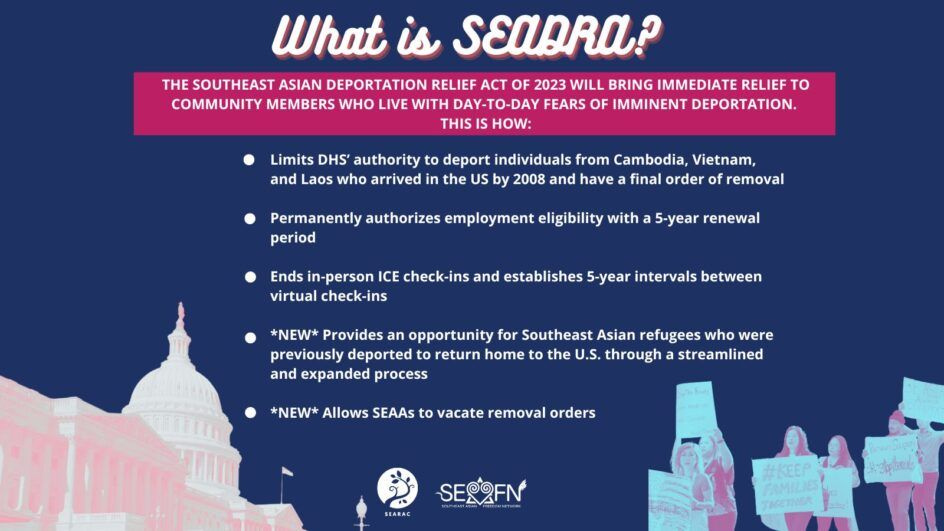
“For the past fifty years, the Southeast Asian community has suffered through not only war, genocide, and refugee resettlement, but also a deportation crisis that has further ripped our community apart,” said Nancy Nguyen, Strategy Director at the Southeast Asian Freedom Network (SEAFN). “SEADRA, which is grounded in the demands of our impacted community members, will finally end this cycle of trauma. By addressing the harms of US militarism, failed refugee resettlement, and the destructive impacts of this country’s immigration and criminal legal systems, this bill will ensure that our community no longer faces deportation. As we approach the 50th anniversary of the end of the war in Southeast Asia in 2025, this bill cannot be more timely. We call on lawmakers to support SEADRA so our community can finally heal and be reunited.”
“Through the Southeast Asian Deportation Relief Act, we seek to heal the wounds inflicted by displacement, initially due to US military conflict and decades later because of the United States’ cruel immigration policies,” said Quyên Đinh, executive director of SEARAC. “SEADRA is a crucial step toward restoring humanity and compassion in our immigration system for our community members who seek to live in safety with their families. We celebrate this historic bill alongside our community partners across the country who have fought tirelessly for this moment. SEARAC calls upon lawmakers to support the Southeast Asian Deportation Relief Act and recognize the importance of protecting the rights and dignity of Southeast Asian Americans.”
ABOUT SOUTHEAST ASIAN DEPORTATIONS
In the aftermath of the US’ military interventions in Cambodia, Laos, and Vietnam, Southeast Asian refugees escaping violence, genocide, mass carpet bombings, and persecution sought refuge in the United States. Most were resettled into heavily disinvested communities with limited access to resources or support systems, even as they grappled with the lingering trauma of war and the challenges of migration. In this context, many Southeast Asian youth sought protection from gangs and became entangled with the criminal legal system, leading to criminal convictions and incarceration. Although many impacted Southeast Asians have since rebuilt their lives and given back to their communities, SEAAs are now being removed for decades-old convictions for which they have already served their time. These individuals often have US citizen family members, serve as the primary caregivers in their families, have no recollection of or meaningful ties to their country of origin, and hold deep roots in their local communities here in the United States.
ABOUT SOUTHEAST ASIA RESOURCE ACTION CENTER
SEARAC is a national civil rights organization that builds power with diverse communities from Cambodia, Laos, and Vietnam to create a socially just and equitable society. As representatives of the largest refugee community ever resettled in the United States, SEARAC stands together with other refugee communities, communities of color, and social justice movements in pursuit of social equity.
ABOUT SOUTHEAST ASIAN FREEDOM NETWORK
The Southeast Asian Freedom Network (SEAFN) was formed in 2001 to create a united front against the deportation of Cambodian refugees. Chhaya Chhoum of the Bronx, New York put out a national call to community organizers to solidify a national Southeast Asian grassroots movement, defend our communities from deportations, and move our collective work out of isolation. After two decades, SEAFN is now a national movement family of local organizations dedicated to the mobilization of Southeast Asian communities towards abolition. SEAFN organizes a core network of Southeast Asian-led organizations across the country including: Asian American Resource Workshop (AARW) (MA); Freedom, Inc. (WI); Hmong American Women’s Association (HAWA) (WI); Khmer Advocacy and Advancement Group (KhAAG) (WA); ManForward (national); Mekong NYC (NY); MN8 (MN); Providence Youth Student Movement (PrYSM) (RI); and VietLead (PA/NJ).

